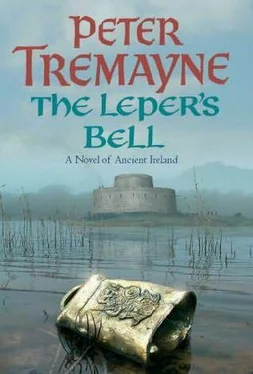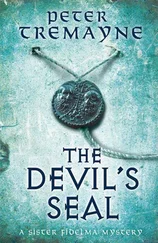Peter Tremayne - The Leper's bell
Здесь есть возможность читать онлайн «Peter Tremayne - The Leper's bell» весь текст электронной книги совершенно бесплатно (целиком полную версию без сокращений). В некоторых случаях можно слушать аудио, скачать через торрент в формате fb2 и присутствует краткое содержание. Жанр: Исторический детектив, на чешском языке. Описание произведения, (предисловие) а так же отзывы посетителей доступны на портале библиотеки ЛибКат.
- Название:The Leper's bell
- Автор:
- Жанр:
- Год:неизвестен
- ISBN:нет данных
- Рейтинг книги:4 / 5. Голосов: 1
-
Избранное:Добавить в избранное
- Отзывы:
-
Ваша оценка:
- 80
- 1
- 2
- 3
- 4
- 5
The Leper's bell: краткое содержание, описание и аннотация
Предлагаем к чтению аннотацию, описание, краткое содержание или предисловие (зависит от того, что написал сам автор книги «The Leper's bell»). Если вы не нашли необходимую информацию о книге — напишите в комментариях, мы постараемся отыскать её.
The Leper's bell — читать онлайн бесплатно полную книгу (весь текст) целиком
Ниже представлен текст книги, разбитый по страницам. Система сохранения места последней прочитанной страницы, позволяет с удобством читать онлайн бесплатно книгу «The Leper's bell», без необходимости каждый раз заново искать на чём Вы остановились. Поставьте закладку, и сможете в любой момент перейти на страницу, на которой закончили чтение.
Интервал:
Закладка:
‘Several people heard of the argument he had with Petrán when we returned to the palace the other evening.’
Fidelma hesitated for a moment and then turned to Finguine.
‘Has Brother Conchobar returned to Cashel as yet?’
Finguine shook his head
‘Do we know what it was that sent Brother Eadulf riding west?’ pressed Gorman, returning to the subject. ‘Any information should be shared.’
‘I was not informed,’ replied Fidelma. ‘I did not see him before he left. He wrote me a note. All I know is that he was going to the abbey of Coimán.’
Gorman rubbed his chin thoughtfully. ‘Beyond Cnoc Loinge it is not wise that he travel alone.’
Colgú was impatient. ‘Well, let us return to the matter in hand. Are we all agreed to release the chieftains?’
‘Reluctantly,’ affirmed Finguine. ‘But shouldn’t the council meet and approve such a decision? Bishop Ségdae, Brehon Dathal… perhaps we should wait for Capa’s return?’
Colgú shook his head. ‘The response urges prompt action. If the deed is to be done, let us do it now. Capa might not return for several days. Bishop Ségdae has ridden to Imleach. Brehon Dathal is involved in the matter of Petrán and I am not sure that his advice…’ He paused and shrugged. ‘Let the rest of the council be told of our decision when they are available and they can question it when we all meet later.’
Fidelma said: ‘But I want a word with the chieftains before they are released.’
‘You want to speak with these Uí Fidgente?’ Her brother raised his eyebrows in surprise.
‘Do you have an objection?’
‘Very well, Fidelma,’ he replied. ‘So be it. I shall send for the giall-chométaide to escort you. Unless you want me to come with you?’ The giall-chométaide was the jailer in charge of the hostages. Fidelma replied in the negative, and Colgú turned to Gorman.
‘I will want you to escort the chieftains to the northern road as soon as Fidelma has finished with them.’
The big warrior was looking thoughtfully at Fidelma. He suddenly frowned and turned to Colgú.
‘To the northern road?’
‘At least you can point them in the direction of their home,’ the king explained patiently. ‘We will not then have long to wait for a response.’
It was a while before the giall-chométaide , a wiry little man, with ferret features and a ready smile that Fidelma did not exactly trust, entered the room to receive his instructions from Colgú. When he was told that the three chieftains were to be released, he showed no sign of surprise but impassively acknowledged the order.
At the back of the palace complex was an area that was separated from the rest of the buildings by a high wall through which only someone with permission from the king or his tanist could enter. It was known by the ancient name Duma na nGiall — the mound of hostages. The old word duma once applied to a tumulus and then to a man-made mound often named Duma Dala for a place of assembly. Now, whether a mound of assembly or one of encampment, it was used in the context of a place where prisoners were held. On passing through the gates, preceded by the jailer, Fidelma found herself in a series of austere but well-appointed apartments.
The ferret-faced jailer chuckled at her expression as she looked round.
This is where we keep the nobles taken prisoner in war who will not give their gell — their word of honour — to the king,’ the jailer explained.
A gellach was one who took a pledge under law and by the Creator not to abuse any freedom he was given, as in the manner of a parole. Usually prisoners of war gave their pledge and were allowed the freedom of the clan area or even the kingdom. It had even been known for such prisoners to marry or be adopted by their captors and settle happily in the area. The fact that the Uí Fidgente chieftains preferred to retain their status as prisoners without freedom told Fidelma a lot about their characters.
She found them all together. They were seated in a chamber having finished their first meal of the day. The giall-chométaide announced her.
The lady Fidelma of Cashel, daughter of Failbe Flann, sister to Colgú, king of Muman.’
The men hesitated and then one of them rose to his feet, followed somewhat reluctantly by his companions. They stared at her, their dislike mingled with curiosity.
Fidelma swept all three with a quick scrutiny. One was elderly with features she could only describe as cunning. A large nose and eyes close set, dark, speculative eyes which seemed to bore through her as if searching for a weakness. The lips were fleshy and the face carried a scar of battle, distorting one eyebrow. The other two were younger, swarthy and aggressive-looking — perhaps with a cast of arrogance in their features. One thing that they all held in common was the belligerence of their features as they greeted her.
‘Who has not heard of Fidelma of Cashel,’ the elderly man said slowly, ‘who played such a distinctive role in the overthrow of our lord Eoganán?’ His voice showed that her name was not pleasing to him.
‘And you are?’ Fidelma asked, seating herself and regarding him without expression.
‘I am Cuirgí of Ciarraige. These are my cousins Cuan and Crond.’
‘Sit down and we will talk,’ Fidelma said, turning to the jailer and dismissing him. The Uí Fidgente glanced at one another in surprise.
‘You do not fear to be left alone with the mortal enemies of your people?’ sneered Cuirgí.
‘Do I need to fear?’ replied Fidelma.
They realised that they were still standing before her and Cuirgí promptly sat down, stretching arrogantly. He did not bother to reply to her question.
‘And have you come to lecture us, Fidelma of Cashel?’ he asked, still slightly sneering his words. ‘And in what capacity do you come? As an Eóghanacht princess? As a religieuse? Or as a dálaigh?’
Fidelma folded her hands in her lap. ‘I come as a mother.’
Cuan, one of the younger of the men, smiled bleakly.
‘We have heard that you have decided to partner some foreigner and given birth to his brat.’
Fidelma’s green eyes seemed to change into cold blue and her glance wiped the smile off the man’s face.
‘I am married to Eadulf of Seaxmund’s Ham in the distant land beyond the seas which is called the land of the South Folk,’ she said quietly. ‘Our son is Alchú.’
‘And what is your domestic arrangement to do with us, Fidelma of Cashel?’ asked Cuirgí.
‘Have you heard what has happened to my son?’
To her surprise the men looked blankly at her. Cuirgí said: ‘We hear little talk in our palatial incarceration. What game is this that you are playing?’
Fidelma controlled her features.
‘Are you saying no word has come to you, either by way of palace gossip or through other means, of what has taken place here during the last week?’
Cuirgí leaned forward belligerently.
‘You — an Eóghanacht — are now questioning the word of an Uí Fidgente? Say what it is you have come to say and then begone.’
‘Very well. My son has been kidnapped. He is apparently being held by your supporters in exchange for your release.’
There was no faking the looks of astonishment on the faces of the men before her.
It was Cuirgí, who appeared to be their leader, who recovered first.
‘You appear to be bringing us glad tidings, Fidelma of Cashel.’
‘You will be released.’
The younger men let out gasps of pleasure.
‘You will be released and allowed to ride north for your own lands. Once you have crossed the mountains your confederates have promised that they will release my son. You knew nothing of this plan?’
Читать дальшеИнтервал:
Закладка:
Похожие книги на «The Leper's bell»
Представляем Вашему вниманию похожие книги на «The Leper's bell» списком для выбора. Мы отобрали схожую по названию и смыслу литературу в надежде предоставить читателям больше вариантов отыскать новые, интересные, ещё непрочитанные произведения.
Обсуждение, отзывы о книге «The Leper's bell» и просто собственные мнения читателей. Оставьте ваши комментарии, напишите, что Вы думаете о произведении, его смысле или главных героях. Укажите что конкретно понравилось, а что нет, и почему Вы так считаете.











